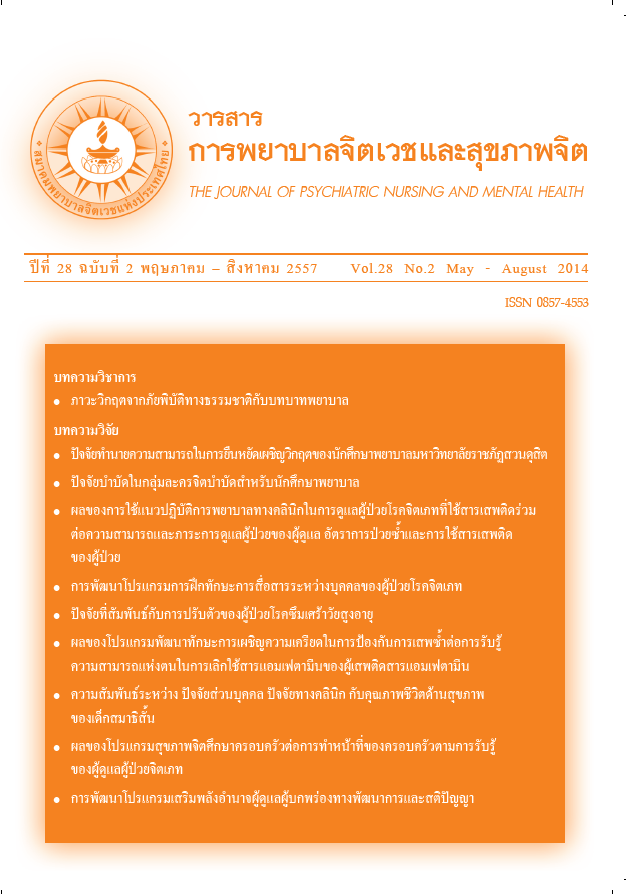ผลของการใช้แนวปฏิบัติการพยาบาลทางคลินิกในการดูแลผู้ป่วยโรคจิตเภทที่ใช้สารเสพติดร่วมต่อความสามารถและภาระการดูแลผู้ป่วยของผู้ดูแล อัตราการป่วยซ้ำและการใช้สารเสพติดของผู้ป่วย
Main Article Content
บทคัดย่อ
วัตถุประสงค์: การวิจัยกึ่งทดลองครั้งนี้มีวัตถุประสงค์เพื่อศึกษาผลของการใช้แนวปฏิบัติการพยาบาลทางคลินิกในการดูแลผู้ป่วยโรคจิตเภทที่ใช้สารเสพติดร่วมต่อความสามารถและภาระการดูแลผู้ป่วยของผู้ดูแล อัตราการป่วยซ้ำและการใช้สารเสพติดของผู้ป่วย
วิธีการศึกษา: กลุ่มตัวอย่างคือ ผู้ป่วยโรคจิตเภทที่ติดสารเสพติดตามเกณฑ์คุณสมบัติที่กำหนด จำนวน 40 คน และผู้ดูแล แบ่งผู้ป่วยเป็นกลุ่มทดลองและกลุ่มควบคุม กลุ่มละ 20 คน เครื่องมือวิจัย ประกอบด้วย แนวปฏิบัติการพยาบาลฯ คู่มือการดูแลผู้ป่วยและผู้ดูแลสำหรับพยาบาล แบบบันทึกข้อมูลทั่วไปของผู้ป่วยและผู้ดูแล แบบวัดความสามารถในการดูแลผู้ป่วยฯ และแบบวัดภาระการดูแลของผู้ดูแลซึ่งหาค่าความเที่ยงโดยใช้สูตรสัมประสิทธิ์แอลฟาของครอนบาค เท่ากับ .85 และ .91 ตามลำดับ วิเคราะห์ข้อมูลโดยสถิติบรรยาย และการทดสอบ dependent t-test และ independent t-test
ผลการศึกษา: ผลการวิจัยพบว่าหลังการทดลองความสามารถของผู้ดูแลผู้ป่วยกลุ่มทดลองสูงกว่าก่อนการทดลองและสูงกว่ากลุ่มควบคุมอย่างมีนัยสำคัญทางสถิติที่ .01 และหลังการทดลองภาระการดูแลของผู้ดูแลกลุ่มทดลองต่ำกว่าก่อนการทดลองและต่ำกว่ากลุ่มควบคุมอย่างมีนัยสำคัญทางสถิติที่ .05 ผู้ป่วยที่ได้รับการพยาบาลตามแนวปฏิบัติฯไม่มีการป่วยซ้ำและไม่กลับไปใช้สารเสพติดซ้ำ หลังจำหน่ายออกจากโรงพยาบาล 30 วัน
สรุป: ผลที่ได้จากการศึกษานี้แสดงให้เห็นว่าการที่พยาบาลมีแนวปฏิบัติที่ชัดเจน จะช่วยเพิ่มประสิทธิภาพในการดูแลผู้ป่วยและผู้ดูแล
Objectives: The purposes of this quasi-experimental research were to study the effects of using clinical nursing practice guideline in caring for schizophrenic patients with substance dependence on caregivers’ capabilities and burden, and patients’ relapsed rate and substance use.
Methods: The study samples were 40 schizophrenic patients with substance dependence and their caregivers who met the inclusion criteria. Subjects were divided into experimental and control group with 20 subjects for each group. Research instruments developed by the researchers were Clinical Nursing Practice Guideline (CNPG) in caring for schizophrenic patients with substance dependence, a manual of caring for schizophrenic patients with substance dependence and caregivers for nurse, personal data questionnaire for patients and caregivers, and the caregiver capabilities and burden scales. The Cronbach’s alpha coefficients of the two scales were .85 and .91, respectively. Data were analyzed using descriptive statistics, dependent t-test, and independent t-test.
Results: Results of this study were as follows: after the experiment, capabilities of caregivers in the experimental group were significantly higher than before participating in the CNPG and than those in the control group (p < .01). In addition, after the experiment, burden of caregivers in the experimental group were significantly lower than before the experiment and than those in the control group (p < .05). Thirty days after discharge from the hospital, patients in the experimental group had no relapse rate and showed no use of substance.
Conclusion: The results from this study imply that using CNPG in caring for schizophrenic patients could help nurse to strengthen their care for patients and caregivers.
Article Details
บทความที่ได้รับการตีพิมพ์แล้ว เป็นลิขสิทธิ์ของสมาคมพยาบาลจิตเวชแห่งประเทศไทย


